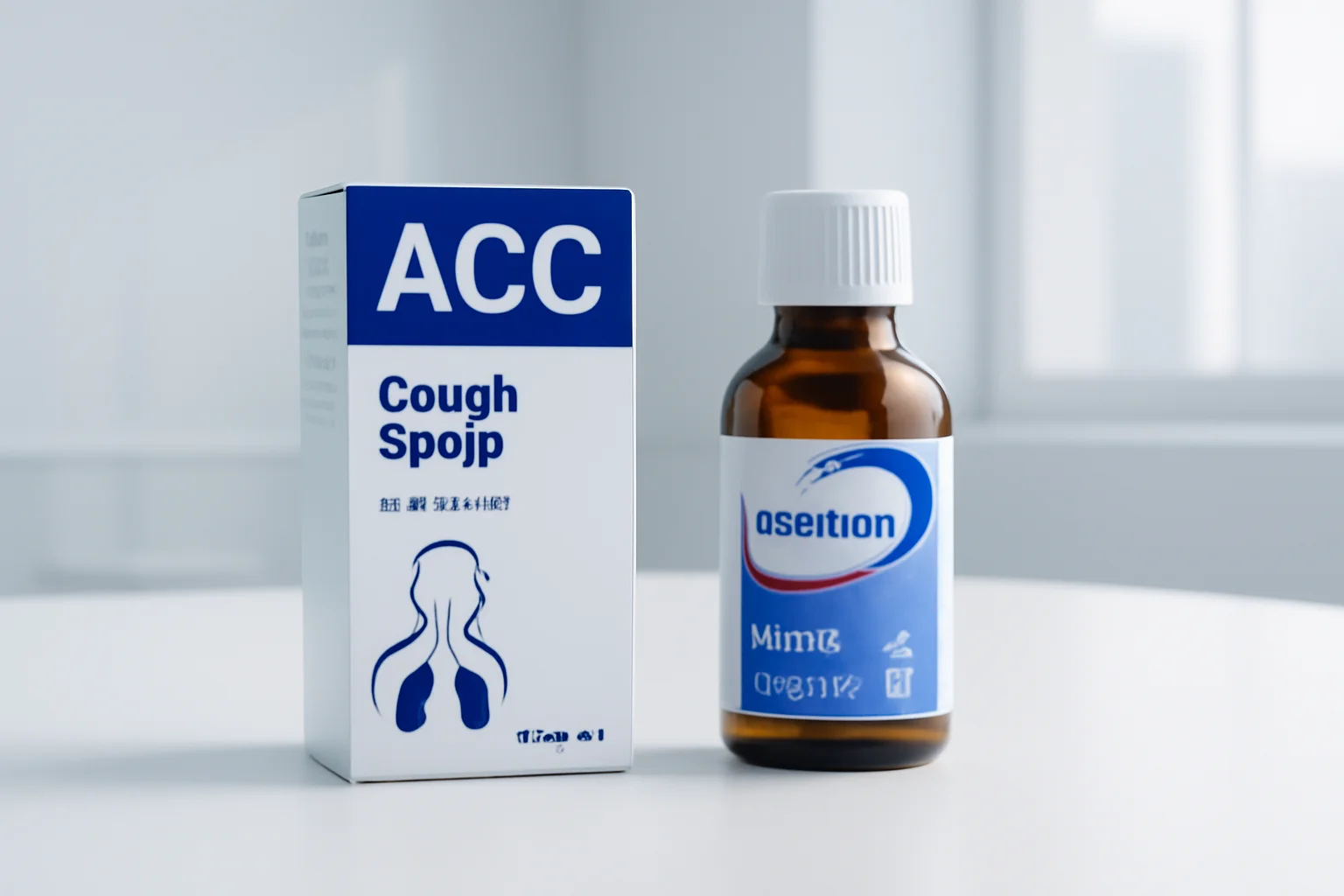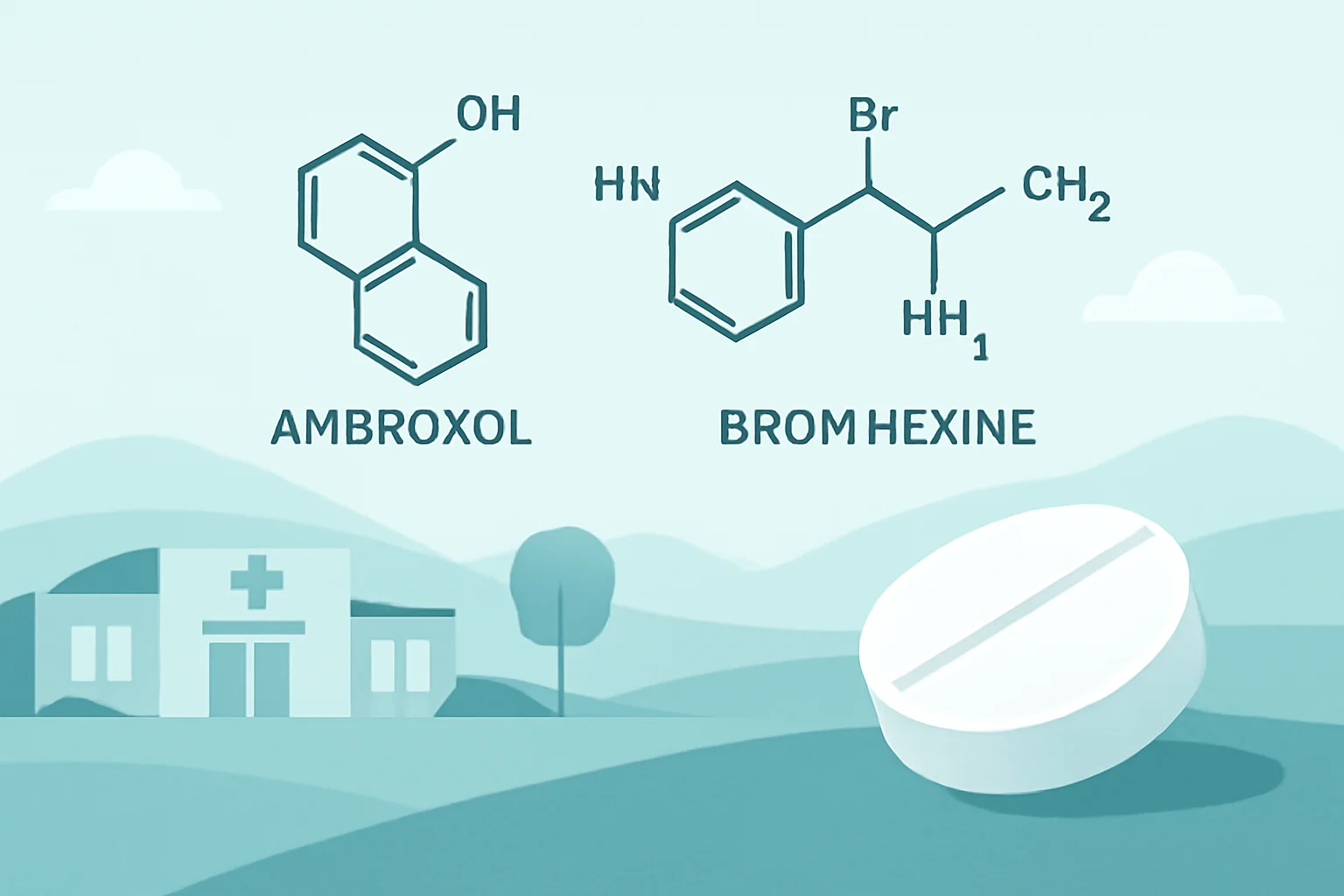-
Ambroxol or Fluimucil: Which is the more effective cough suppressant?
A respiratory diseases often cause discomfort, and selecting the right medications is essential for a quick recovery. Particularly in the areas of cough and mucus clearance, many seek effective solutions. Two popular medications, ambroxol and fluimucil, frequently come up when discussing respiratory issues. Both have their specific advantages and mechanisms of action, which are important to understand for proper use. Ambroxol’s Mechanism of Action and Use Ambroxol is a mucolytic medication widely used for treating respiratory diseases. Its mechanism of action lies in reducing the viscosity of mucus, thus aiding in its removal from the airways. The medication stimulates the glands in the bronchi, increasing mucus production, which facilitates coughing…
-
Fluimucil or ACC: Which is the Better Choice for Cough Relief?
A respiratory diseases are often treated with various medications aimed at relieving cough, nasal congestion, and other symptoms. Particularly, expectorants like Fluimucil and ACC are popular among patients. Both preparations effectively help dissolve and expel mucus from the airways, which is essential in treating respiratory issues. People often ask which is the better choice between the two medications. The choice depends not only on the mechanisms of action but also on the patient’s condition, the severity of symptoms, and individual preferences. The active ingredient in both Fluimucil and ACC is acetylcysteine, which helps to thin mucus and facilitate its expulsion. However, the medications are available in different forms and dosages,…
-
Paxirasol or bromhexine: Which is the more effective cough suppressant?
A respiratory problems world, selecting the right medication is incredibly important. Medications such as paxirasol and bromhexine are widely used for treating cough and mucus dissolution. These drugs work through different mechanisms, and while both can be effective, individual patient needs and the nature of symptoms must be considered in the selection process. Respiratory diseases, such as bronchitis or colds, often require appropriate medication to alleviate symptoms and support the healing process. Choosing the right medication is not only about effectiveness but also about minimizing side effects. It is particularly important for patients to be aware of the effects of medications to avoid unwanted reactions. When choosing between paxirasol and…
-
Fluimucil and ACC: When and Why Should They Be Used?
A respiratory illnesses, such as bronchitis or the common cold, are common issues, especially during the cold months. During this time, coughing, mucus accumulation, and breathing difficulties can significantly affect many people’s lives. Proper treatment is essential for patients to recover quickly and effectively. A wide range of medications is available to alleviate symptoms, but choosing the right one is not always straightforward. Two popular preparations, Fluimucil and ACC, are often mentioned when it comes to treating respiratory problems. Both medications have mucolytic effects, meaning they help to liquefy mucus and clear the airways, but they may differ in their ingredients and mechanisms of action. When making a choice, it…
-
The effects of ACC and bromhexine: when and how do we use them?
The respiratory diseases, such as colds, flu, or bronchitis, complicate the lives of many people. These conditions often come with coughing and mucus production, which is not only unpleasant but also makes daily life difficult. To soothe coughs and clear the airways, many seek effective remedies. Two popular medications, ACC and bromhexine, often come up in public awareness as potential solutions for respiratory issues. Both medications work through different mechanisms, but their goals are similar: to clear the airways and relieve coughing. Understanding the differences in efficacy, application, and side effects between ACC (acetylcysteine) and bromhexine can help make the right choice when faced with respiratory problems. Below, we will…
-
The effect of ACC and Ambroxol in the treatment of respiratory diseases
Respiratory problems, such as cough, asthma, or chronic bronchitis, complicate the lives of many people. Irritation of the airways and the accumulation of mucus often cause uncomfortable symptoms, and managing these symptoms is essential for a comfortable lifestyle. Various medications are available to relieve cough and clear the airways, two popular options being ACC (acetylcysteine) and Ambroxol. Both medications are used for treating respiratory diseases, but they have different mechanisms of action and are suitable for alleviating different symptoms. Choosing the right medication can often be a challenging task, and understanding the differences between the two substances is crucial. ACC and Ambroxol assist in treating respiratory problems in different ways…
-
The effect of ACC Long and expectorants on respiratory health
A respiratory diseases, such as colds or influenza, are common occurrences that affect many people’s lives. These illnesses often come with coughing and respiratory blockages, causing discomfort for the patient. In the fight against cough, many seek effective solutions, and in this search, expectorants and the ACC Long (acetylcysteine) medication come to the forefront. Expectorants are used to thin and remove mucus, while ACC Long is specifically developed to dissolve mucus and clear the airways. Although both solutions aim to clear the airways and relieve coughing, it is important to be aware of the differences and the proper way to use them. Knowledge of medical literature and the application of…
-
Ambroxol or Paxirasol: Which is the more effective cough suppressant?
Respiratory diseases are a serious problem worldwide, and people often seek effective solutions to alleviate their symptoms. Ambroxol and paxirasol are two medications used for treating respiratory conditions, but they have different mechanisms and active ingredients. Ambroxol is a mucolytic agent that helps to loosen mucus, while paxirasol is an antihistamine that can be particularly useful in cases of allergic reactions. Medicine is constantly evolving, and the effectiveness and applicability of different medications cover a wide spectrum. It is important for individuals to be aware of the benefits and drawbacks of various drugs to best support their health. This article provides a detailed overview of the characteristics, applications, and essential…
-
Acc or Mucosolvan: Which is the More Effective Cough Suppressant?
Respiratory diseases, such as colds or bronchitis, often affect us, especially during the cold months. These problems are usually accompanied by coughing and mucus production, making everyday life difficult. Coughing, as a reflex, helps to clear the airways, but when the mucus becomes too thick, breathing becomes more difficult, and coughing can also become painful. At this point, it is important to apply appropriate treatment methods that can help clear the airways and relieve coughing. The Mechanism of Action and Use of ACC ACC, also known as acetylcysteine, is a mucolytic agent that helps to thin mucus accumulated in the airways. This active ingredient reduces the viscosity of mucus, facilitating…
-
Ambroxol or bromhexine: Which is the more effective cough suppressant?
A wide range of medications is available for the treatment of respiratory diseases, among which expectorants play a prominent role. These preparations help clear the airways by removing mucus, thereby facilitating breathing and reducing cough symptoms. Two popular expectorant active ingredients, ambroxol and bromhexine, may be familiar to many, but the question often arises as to which is more effective, or whether there is a difference between the two. People often seek solutions for respiratory complaints but may not always know what type of medication to choose. There are several similarities and differences between the two active ingredients that can influence the choice. Furthermore, the active ingredients are available in…









